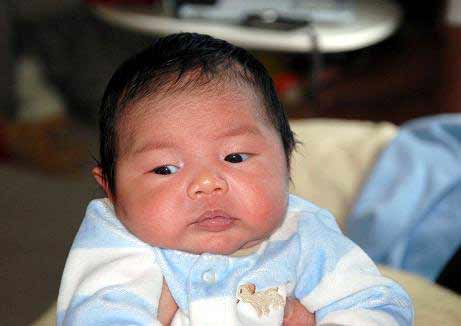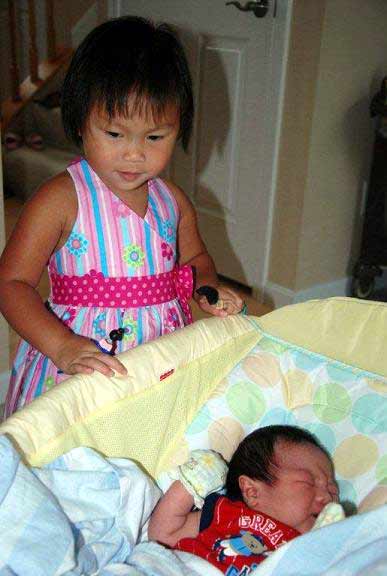

November 2010 Edition
CIM Class 1972 web site publication.
 |
 | |
November 2010 Edition | CIM Class 1972 web site publication. | |
“Happiness is an endowment and not an acquisition. It depends more upon temperament and disposition than environment.”– John J. Ingalls.
Simplify
A wise person once said that happiness is learning to accept the impossible, do without the indispensable, and bear the intolerable. That’s a hard stuff. Many of us can hardly even accept any ripple of a day’s activities. We want to move through anything faster than the hands of the clock allow. But what he implies, I believe, is that happiness is actually nothing more than making life as simple as possible. The question however is not how you can make it simple but how willing are you to re-evaluate your lifestyle and make changes by letting go of at least some of your desires to help simplify your life.
Yet no matter how simple our life is, there are always circumstances we cannot control and many of these circumstances would ripple our calm, heat up our coolness and snap our nerves like a rubber band. But since we cannot control circumstances, we should not allow circumstances to control us. Of course, it’s easier said than done. Anything that thwarts our plan or disrupt our routines is often enough to put us into a tailspin.
The Thought shall set you free
If we think about it, we do have the choice to respond to circumstances, and we think further, we'd realize that we actually have control over our choices. We may not consider anger, upsets and frustrations as our choices of response especially that they seem to automatically explode like a balloon that hits a pin. Yet notice that for every emotion, negative or positive, there is a thought behind it and that thought is our choice and thus it’s within our control. All you have to do is look for that thought, examine it and change it, and you’d be surprised to realize that your feeling changes accordingly. To paraphrase the Bible – “Seek for the thought, and thought shall set you free.” If you choose negative thought, you’d get negative emotion that puts your intellect in prison, unable to think freely to find a rational solution. If you choose positive thought, you’d get positive emotion, setting your intellect free to focus on how to diffuse a disturbing situation.
Now here’s an example. Many of you would probably get upset or even angry if I tell you you’re a contemptible arrogant bastard. Well, why would you choose to get upset or angry? It’s because you probably think it’s unfair and inappropriate criticism, or it's an insult. You don’t deserve it. It makes you feel bad. Your character and behavior are being questioned. You may also think that I’m rude and disgusting. How dare of me to call you a contemptible arrogant bastard? Notice that the more you focus on the negative thought, the stronger your negative emotion becomes. Of course, you have the right to be angry. But the question is – Is anger that drains so much energy out of you worth it? Now suppose you change that thought to say: “Cle is just joking, he doesn’t mean it, and it’s not true, anyway,” or “I’ve been called arrogant before. So what’s the deal?” Now how would you feel? Better, isn’t it? So every time you have a negative emotion, ask yourself: “What am I thinking?” In other words, don’t focus on your emotion or on the person that initiated and escalated your negative emotion. Focus on the thought you’re thinking at the time and then modify it.
Attitudes
Our thoughts dictate the quality of our lives. Although the single most important factor in personal happiness and our impact on others is our attitude, our attitude is the by-product of our thoughts. It is in our attitude that we discover strength or weakness, hope or anxiety, determination or frustration. Merry, upbeat people who look for the good attract the good, just as beautiful and fragrant flowers attract varieties of beautiful butterflies. Our attitude determines what we get out of life. Through experience many of us must have noticed that most of our troubles come from our own attitudes and reactions – not from circumstances around us. In fact the biggest problem is the reaction to the problem. Negative reactions like anger, upset, frustration and resentment can easily sweep and suck us into the whirlpool irrationality and thus make us unable to approach the problem rationally.
Anger in particular has consequences that are all too often unpleasant. Under any circumstances it is an inappropriate response. It makes you behave destructively and you end up regretting your behavior. You rehash the event over and over, each time feeling more embarrassment, guilt and remorse. Before long you can’t sleep – you’re sick because of what you’ve done. Thus anger is not worth the suffering it causes us and those around us. Believe me. I had struggled with anger most of my life and I’m still struggling with it at least occasionally but I have become better dealing with it. As soon as you realize that you have actually contributed to the heat of the situation, apologize right away especially to your children, spouses or families. Many of us often take our children in particular for granted. But they have feelings that when hurt for no good reason may make them harbor resentment. You don’t want that in your kids. A comedian once advised: “Be nice and kind to your children. They choose your Nursing Home.”
Before, my mistake was that I often justified my anger with blames, sometimes simply denied it, ignored it, sidestepped it, occasionally blotted it out with a couple of beers and worst, repressed it. I had to learn to stop running away from negative feelings like anger, fear and resentment and become willing to walk through them. I regularly practiced to identify them; understand them; and come to terms with them in constructive rather than destructive ways. I began to realize the value and importance of forgiveness in relation to happiness or peace of mind. Foregiveness unties the knot that binds you to resentment and regret. Sometimes forgiveness is the only force that can blast away the boulders of resentment, insecurity and bitterness from the door to feeling good. It's better to be a peacemaker rather than a grudge-holder. Willingness to forgive is easier when you learn to accept yourself as you are, warts and all and to accept reality as it is, not as it should be.
Freedom and responsibility
We are free to act, to think, to dream our own dreams, but only when we choose to exercise our freedom. It’s with such freedom that we have power over our feelings, our attitudes, and our behavior in every instance. Yet all too often many of us pretend exactly the reverse – “He makes me mad.” You’ve hurt my feelings.” Etc. But who owns your feelings? Or who has control over them? With ease, we unwittingly refuse to take responsibility for whatever mood we are in. We readily forget that we determine our own attitudes and that freedom comes with responsibility. We prefer blaming to give us relief which is only temporary, yet blaming is an irresponsible way of responding to a situation although politicians may think otherwise.
Peace of mind comes not from trying to satisfy our wants as we perceive them, but from accepting life as it unfolds. In life, things don't actually change and if there is one thing that really changes and that we have no control over – it's our age. Like it or not, we are all getting old. It’s the only change we better believe in. Soon most if not all of us will be losing the “audacity of hope.” And the enthusiasm to pursue the “dreams of our father” will soon fade. Bold risk is for the young. If we take such risk and fail, it’s going to be almost impossible to recover our losses. Our time is short; our energy is less. But there are still chances to take. That’s how to succeed. But not foolish ones like some of the ones we took when we’re still young, putting our retirement money, for example, in the stock market when it was already too high before it crashed. Success comes from minimizing risk, not making it greater.
No one is exempt from the advancement of time. Beauty fades, joint stiffens, muscles and bones ache. Long before it seems believable, we begin to notice that we can’t see as well, stay up as late at night, or eat the same rich food. Although we have no control over the advancement of time and our aging process, we have control over our attitude to growing old. How do you see yourself? Are you going to be fragile and slow or strong and spry? If you believe that life is basically over at turning 65 or 70, then you’ll probably buy a nice rocking chair to sit on and wait passively for death to arrive.
But like our youth, the quality of our old age is largely up to us. Certainly, many people struggle in trying to turn back to their youth. To pull up this trick, they try everything from starvation to surgery. It makes you wonder whether the first half of life is such a series of delight that anything beyond it must be less. But all the artful manipulation in the world can never slow the aging process. So turn your focus inward, make changes and resolve to be better and wiser than you are. Check your emotions frequently in relation to your thoughts.
Accepting the Shadow
Our progress in life is equal to our capacity to let go of our problems and disappointments and move ahead with the momentum of a positive attitude. We cannot grow if we choose to be trapped by circumstances beyond our control. We cannot move on if we choose to be tied to our problems. If we focus on matters that disturb us, they’ll keep us disturbed. If we are obsessed with our problems, our obsession will leave no room for solutions. There is no question that our thoughts are very important. Otherwise God would not have given us brains.
Carl Gustav Jung said: “Even a happy life cannot be without a measure of darkness, and the word “happiness” would lose its meaning if it were not balanced by sadness.” I believe that it was also Jung who indicated that even the best among us has dark places in his soul – fears, guilt, prejudices, etc. – the capacity for sin, I suppose. Jung did not try to separate good and evil. They both exist in human heart. He called the propensity to evil the Shadow. And he believed trying to deny or repress the Shadow is dangerous because it can’t be done. He believed you have to recognize your Shadow, come to grips with it, accept it, and integrate it. The day of reckoning always comes to everything you try to repress. Whatever you bury deepest is always waiting for the moment of greatest stress to explode to the surface. So don’t deny, let alone repress negative feelings especially anger that would only lead to resentment and grudge. Think of a way to express them constructively.
As we continue to age, each of us should learn to redefine happiness to our own standard, not someone else’s, and re-evaluate that standard every now and then. There is always some “measure of darkness” that comes to our life whether we like it or not. But it’s the light we should focus on that sometimes shines upward like a beacon beating back the tattered remnants of the night. In times of “darkness,” we can always sit on our backyard porch, relax and enjoy the fresh air brushing our face like a lover’s caress.
"Wit penetrates; humor envelopes. Wit is a function of verbal intelligence; humor is imagination operating on good nature." ---Peggy Noonan
A man and woman had been married for more than 60 years. They had shared everything. They had talked about everything. They had kept no secrets from each other except that the little old woman had a shoe-box in the top of her closet that she had cautioned her husband never to open or ask her about.
For all of these years, he had never thought about the box, but one day the little old woman got very sick and the doctor said she would not recover.
In trying to sort out their affairs, the little old man took down the shoe-box and took it to his wife's bedside. She agreed that it was time that he should know what was in the box. When he opened it, he found two crocheted dolls and a stack of money totaling $95,000. He asked her about the contents.
"When we were to be married," she said, "my grandmother told me the secret of a happy marriage was to never argue. She told me that if I ever got angry with you, I should just keep quiet and crochet a doll."
The little old man was so moved; he had to fight back tears. Only two precious dolls were in the box. She had only been angry with him two times in all those years of living and loving. He almost burst with happiness.
"Honey," he said, "that explains the doll, but what about all of this money? Where did it come from?"
"Oh," she said, "That's the money I made from selling the dolls."
She married and had 13 children. Her husband died. She married again and had 7 more children. Again, her husband died. But, she remarried and this time had 5 more children. She finally died after having 25 children.
Standing before her coffin, the preacher prayed for her. He thanked the Lord for this very loving woman and said, " Lord, they're finally together."
One mourner leaned over and quietly asked her friend, " Do you think he means her first, second or third husband? "
The friend replied, " I think he means her legs."
A cabbie picks up a Nun. She gets into the cab, and the cab driver won't stop staring at her. She asks him why he is staring.
He replies: "I have a question to ask you, but I don't want to offend you".
She answers, "My son, you cannot offend me. When you're as old as I am and have been a nun as long as I have, you get a chance to see and hear just about everything. I'm sure that there's nothing you could say or ask that I would find offensive."
"Well, I've always had a fantasy to have a nun kiss me."
She responds, "Well, let's see what we can do about that:
#1. You have to be single, and...
#2. You must be Catholic."
The cab driver is very excited and says, "Yes, I'm single and Catholic!"
"OK" the nun says. "Pull into the next alley."
The nun fulfills his fantasy with a kiss that would make a hooker blush. But when they get back on the road, the cab driver starts crying.
"My dear child," said the nun, "why are you crying?"
"Forgive me but I've sinned. I lied. I must confess, I'm married and I'm Jewish."
The nun says, "That's OK, my name is Kevin and I'm going to a Halloween party."
 |  |
 |  |
 |  |
 | |
 |  |
   |

|